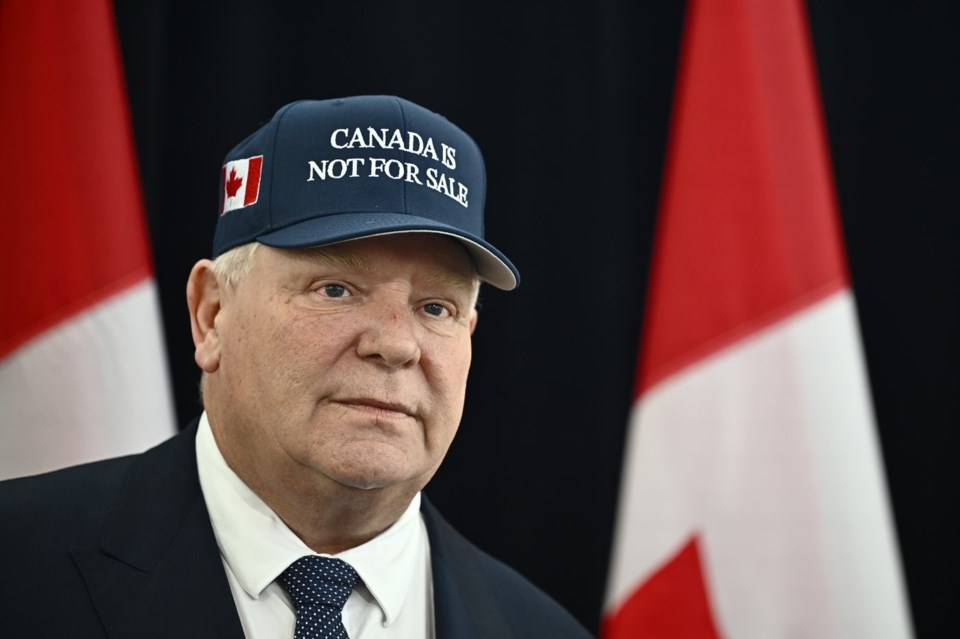TORONTO — Ontario's political parties have been preparing for months for the possibility of an early election, but next week’s snap election call has pushed planning to a fever pitch.
Premier Doug Ford has announced that he will meet with the lieutenant-governor on Tuesday to trigger an election campaign beginning Wednesday, for a vote on Feb. 27.
He said he needs a new mandate, with the biggest majority in provincial history, in order to represent Ontario's interests amid threatened tariffs.
But opposition parties accuse Ford of opportunism and trying to capitalize on favourable polling.
The Ontario Liberal Party has also said it's worried that Ford could violate election laws that limit government activity during an election.
The party issued a letter Sunday raising concerns that Ford's work pushing back against tariffs, including his travel to the U.S. and role as Chair of the Council of the Federation, could see taxpayer funds used for something that could be raised as a political issue during the election.
It said the work would be "explicitly partisan in nature" because of Ford has used the tariff threat as the reason for the election.
Regardless of the reason, it's happening, and the parties are all now in a flurry of nominating candidates, finalizing platforms, making ad buys, and training volunteers.
Liberal campaign co-director Genevieve Tomney says the party has been getting ready for months and putting an emphasis on fundraising so they would be ready whenever an election was called.
"Are we kicking into high gear in a way that is now on a super expedited timeline?" she said. "Sure, but we've been preparing to put these building blocks in place, and we're ready for it."
As of Friday, the Liberals said they had more than 100 candidates nominated, though that includes some with final administrative steps "pending."
But their website only showed 46 candidates and Rose Zacharias, one of the party's two campaign co-chairs, isn't set to be officially nominated until Feb. 1. Half a dozen candidates were set to be officially nominated throughout the weekend.
The NDP said it had nominated 36 candidates as of Friday and would have 39 by the end of the weekend, with several more to come next week. The party held a "campaign school" last weekend, training campaigners on organizing canvassing, managing data and getting supporters to the polls.
The Progressive Conservatives have candidates in 88 ridings, who so far largely consist of returning caucus members, with a ways to go before reaching a full slate of 124.
The party was set to hold a "super caucus" meeting this weekend, bringing Tories together to discuss strategy as they prepare to launch the campaign.
Ford was asked on Friday if he would be unveiling a fully costed platform at some point during the campaign and he offered contradicting responses.
"That's why we have budgets," he said at first, though a minute later he committed to "fully releasing it."
During the 2022 campaign, the Progressive Conservatives ran on a budget they tabled but didn't pass before triggering their election, having it effectively serve as their platform.
In 2018, Ford's campaign had a compilation of campaign promises but the document did not account for how he intended to pay for those.
The Greens have also been busy nominating candidates, celebrating reaching half of a full slate on Friday.
They broke a record last year by raising $2.4 million and will be zeroing in on a few ridings where they believe they can win, including Parry Sound-Muskoka, which is currently held by Progressive Conservative Graydon Smith. The Greens' Matt Richter came second there in 2022.
They’re also looking at Bruce-Grey-Owen Sound and Wellington-Halton Hills in southwestern Ontario, where they have local councillors running.
"We’re prepared and ready to go," Green Party Leader Mike Schreiner said.
The Greens believe they have momentum after doubling their seat count — to two — in late 2023 when Aislinn Clancy took Kitchener-Centre in a byelection. Schreiner hopes to double or triple that number in this election.
"We're confident that we're going to increase our seat count," Schreiner said over the phone from a campaign office in Bracebridge, Ont.
"We're the one party really talking about putting people before profits, especially when it comes to addressing the housing affordability crisis, the fact that we want people to have access to a family doctor, we don't want to see rural hospitals closed and addressing overcrowded classrooms."
This report by The Canadian Press was first published Jan. 26, 2025.
Allison Jones and Liam Casey, The Canadian Press




